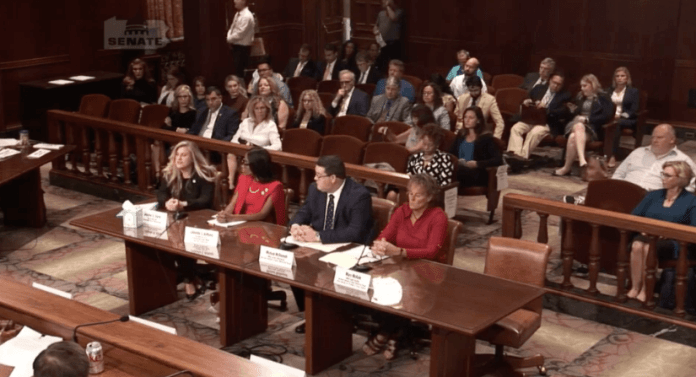Pennsylvania Is Once Again Debating How to Address the Victims of ‘predator Priests.’ Here’s What We Know
By Elizabeth Hardison
It’s been nearly a year since the Pennsylvania state Senate failed to vote on a bill that would have given the victims of “predator priests” a two-year window to sue their abusers and the churches where they worked. The question of whether or not to reform Pennsylvania’s statute of limitations for child abuse victims, or to create a pathway for adult victims to seek legal redress for decades-old cases, returned to the forefront of the chamber on Wednesday. That’s when the Senate Judiciary Committee heard five hours of testimony from legal experts, church representatives, and sexual abuse survivors . Bills in the House and Senate would implement the recommendations made in a grand jury report released in 2018 by Attorney General Josh Shaprio, which uncovered a decades-long pattern of abuse and coverups in Pennsylvania’s Catholic churches. Those recommendations include eliminating the criminal statute of limitations, as well as the more controversial creation of a “civil window” that would allow older victims to sue in civil court. Judiciary Committee Chairwoman Lisa Baker, R-Luzerne, left promptly after the hearing without saying whether or not she would allow her committee to debate that legislation. Wednesday’s session was the first public hearing on those proposals since 2018. Here’s what we learned. Most agree that Pennsylvania’s statute of limitations need to change Under current law, children who are sexually abused in Pennsylvania have until they turn 50 to press criminal charges against their abusers. They have until age 30 to sue them in civil court — a process that some victims pursue to seek monetary damages for suffering they’ve endured. Reform advocates say those laws preclude many victims from seeking justice against their abusers. They point to research that says many don’t seek recourse through the courts or the criminal justice system until they’re in their 50s. Some states have changed their laws to better reflect the growing consensus that victims need more time to heal before facing their alleged abusers in court. This year alone, more than ghree dozen states have introduced bills that would reform or abolish statute of limitations for childhood sexual abuse cases, Hamilton said. Pennsylvania’s laws “have now made it one of the worst states in the United States for access to justice for child sex abuse,” she said. Players such as the Pennsylvania District Attorneys Association support eliminating criminal statute of limitations for child sexual abuse cases. The Insurance Federation of Pennsylvania also supports the move prospectively, or for future cases, even though it opposes applying the standard retroactively. At least one Republican senator thinks the proposal passes constitutional muster There’s less agreement on another key proposal recommended in the 2018 grand jury report: opening a two-year “retroactive window” during which victims of any childhood sexual abuse case could bring a civil lawsuit against their alleged abusers. The debate around that proposal boils down to the question of whether or not it would comply with the state’s Constitution. To Sen. Wayne Langerholc, a Clearfield County Republican and former prosecutor, the answer is an unequivocal “yes.” Langerholc told the Capital-Star that he rejects the argument that the civil window would violate the remedies clause of the state Constitution, which establishes a citizen’s right to seek legal remedy for “any injury … to his lands, goods, person or reputation.” According to Langerholc, the remedies clause is clearly “pro-plaintiff,” since it establishes recourse for people who have suffered harm. That means it can’t shelter an institution or person from culpability if they want to fend off a lawsuit, he said. Langerholc also rejects the argument, raised by Senate President Pro Tempore Joe Scarnati, R-Jefferson, and others, that the lawsuits filed within the two-year window would bankrupt churches and other institutions forced to pay out millions of dollars of damages to abuse victims. But as Langerholc said during the hearing Wednesday, “maybe that’s the wake up call that they need.” “Victims need their day and need accountability,” Langerholc said. “What’s been done cannot be done any longer, and we need to let the healing process begin.” If lawmakers don’t settle the issue in Harrisburg this year, voters could do it at the ballot box Hamilton said she was “encouraged” by what she heard during Wednesday’s lengthy hearing, “largely because of what I heard from Sen. Langerholc. He was 100 percent with us.” But Hamilton isn’t convinced that support from a smattering of Republicans will lead to the reforms she and victims hope to see from the Legislature. She thinks the issue could drag on for years and become a key point in midterm and gubernatorial elections in the future. “I don’t know what they’re going to do this year, but I do think this will end up becoming an election issue,” Hamilton said. Shapiro is widely believed to be a contender for the Democratic nomination for governor in 2022. Hamilton thinks he’ll have a strong base of support from clergy abuse victims. “Survivors are going to get behind Josh Shapiro for good reason,” Hamilton said. “He’s done right by them.” Hamilton said that individual Republicans have been staunch advocates for victims on “isolated issues.” But as a whole, she said, “I think that the Republicans increasingly are having a hard time being credible on doing something for victims.”
|
.
Any original material on these pages is copyright © BishopAccountability.org 2004. Reproduce freely with attribution.
